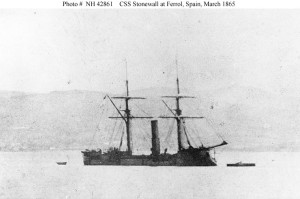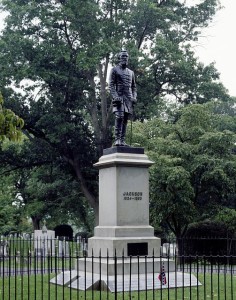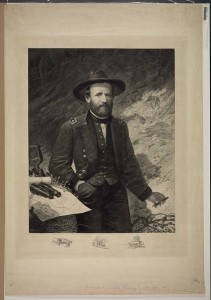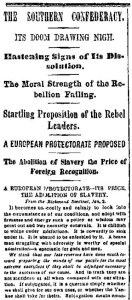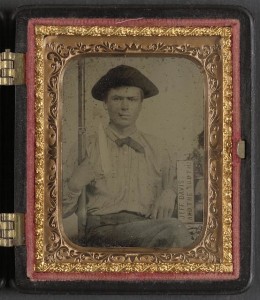-
Recent Posts
Recent Comments
Daily News - 150 Years Ago
General Civil War Sites
Other Resources
WordPress
Topical Paradise
- 19th NY Volunteer Infantry
- 33rd New York Infantry Regiment
- 50th New York Engineer Regiment
- 1860 Election
- Abraham Lincoln
- Andrew Johnson
- Army of the Potomac
- Battle of Fredericksburg
- Benjamin Franklin Butler
- Charleston
- Conscription
- Copperheads
- draft
- Edwin M. Stanton
- Fort Sumter
- George B. McClellan
- George Gordon Meade
- George Washington
- Gettysburg Campaign
- Horatio Seymour
- inflation
- Jefferson Davis
- New York City
- Overland Campaign
- Peninsula Campaign
- Presidential Reconstruction
- Prisoners of War
- Reconstruction
- recruitment
- Richmond
- Robert E. Lee
- secession
- Seneca Falls NY
- Siege of Petersburg
- Slavery
- South Carolina
- Southern Economy
- southern scarcity
- Thanksgiving
- The election of 1864
- Ulysses S. Grant
- Virginia
- William H. Seward
- William Tecumseh Sherman
- World War I
Categories
- 100 Years Ago
- 150 Years Ago
- 150 Years Ago This Month
- 150 Years Ago This Week
- 160 Years Ago
- 400 Years Ago
- 800 Years Ago
- After Fort Sumter
- Aftermath
- American Culture
- American History
- American Society
- Battle Monuments
- Battle of Fredericksburg
- Battlefields
- Books I've Enjoyed
- Chancellorsville Campaign
- Civil War Cemeteries
- Civil War prisons
- Confederate States of America
- First Manassas – Bull Run
- Foreign Relations
- Gettysburg Campaign
- Impeachment
- Lincoln Administration
- Maryland Campaign 1862
- Military Matters
- Monuments and Statues
- Naval Matters
- Northern Politics During War
- Northern Society
- Overland Campaign
- Peninsula campaign 1862
- Postbellum Politics
- Postbellum Society
- Reconstruction
- Secession and the Interregnum
- Siege of Petersburg
- Slavery
- Southern Society
- Technology
- The election of 1860
- The election of 1864
- The election of 1868
- The Election of 1872
- The election of 1920
- The Grant Administration
- Uncategorized
- Veterans
- Vicksburg Campaign
- War Consequences
- World Culture
- World History
- World War I
Subscribe by Feed
Subscribe by Email
don’t jump
From a Seneca County, New York newspaper in January 1865:
Heading off the Bounty Jumpers.
The Elmira Advertiser says Maj. J. Ladd, Paymaster U.S. Army, has been stationed at Elmira, for the purpose of taking charge of the money received as bounty by new recruits in the service. Paymasters have been similarly been sent to all the principal military posts in the country for the same purpose. Under this arrangement Major Ladd, in behalf of the Government, will take into his possession all the money received by each recruit, except $20. He will open an account with each man, and no money can be drawn from him until the recruit reaches the front, unless he is satisfied it is for a bona fide transaction, and for a proper purpose. The arrangement is designed for the benefit of the recruit as well as the Government. Thus, it is hoped, the system of bounty jumping, which has become an enormous evil, will be effectually broken up.
So far I have not seen anything else about the army controlling the timing of bounties paid, but bounty jumpers were still being executed in 1865, as the February 18, 1865 issue of Harper’s Weekly (at Son of the South) points out:
A bounty jumper, named James Devlin, was executed February 3, at Governor’s Island, in the presence of a large number of spectators. The accused had twice deserted from the army, and was convicted for both offenses. In approving the finding of the court-martial, General Dix signified his intention of checking the rapidly increasing and dangerous practice of desertion. The execution was conducted in an admirable manner by the authorities, and impressed all present with its solemnity. The entire command of the island, and a large number of new recruits, were assembled, to whom the spectacle was a terrible warning.
In a comprehensive article about soldiers’ pay at Cincinnati Civil War Round Table William C. Moffat, Jr. mentions bounty jumpers as the “bully boys engaged in the fine art of repeated desertions”.
“An army of harmless Yankees”
From a Seneca County, New York newspaper in January 1865:
STATISTICS OF LIBBY PRISON. – An army of harmless Yankees have passed through Richmond within the year just expiring. – From the statistics of the clerk of Libby Prison, Mr. Ross, we learn that from the first of January, 1864, to the 19th of December, of the same year, 31,630 yankee prisoners, of all grades, nations, tongues, complexions and kindreds, passed the doors of Libby, as Prisoners of war. This number is independent of about twenty thousand captured at Spottsylvania and elsewhere in Virginia, who were sent South without touching Richmond. Since the war began 250,000 men have passed the doors of the Libby, and departed as prisoners of war. – Richmond Paper.
The harmless Yankees were still occupying the Libby in the New Year. From the Richmond Daily Dispatch January 9, 1865:
Arrival of prisoners.
–Ninety-two Yankee prisoners, including two commissioned officers, captured recently in Southwestern Virginia, arrived in this city on Saturday, and were committed to the Libby prison.
Posted in Civil War prisons, Confederate States of America
Tagged Erastus Ross, Libby Prison, statistics
Leave a comment
Big Data
The average Union soldier had more girth than the average Rebel?
Recently I read about the importance of statistics and statisticians to the British government during World War II. Here’s some evidence that during the American Civil War a Northern NGO compiled and analyzed some data about Union and Confederate soldiers – their relative sizes and birth countries.
From a Seneca County, New York newspaper in January 1865:
NORTHERN AND SOUTHERN SOLDIERS. – Some curious facts have been disclosed by statistics furnished by the Sanitary Commission, which body has caused measurements to be made on an extensive scale in our armies, and among rebel prisoners. – It appears that Southern soldiers average one inch more in stature than Northern troops, but one inch less in girth. Five per cent. of the rebel prisoners were of foreign birth, and twenty per cent. of Union soldiers were foreigners.
Apparently the South had been using statistics to prove that the South had more than enough material wealth to carry on the war. I think I’m going to take some statistics with a grain of salt.
summarized judgment
Seneca Falls papers during the Civil War seemed to lean strongly Democrat. Here one of the publications has no criticisms of President Lincoln for firing the political General Butler. From a Seneca County, New York newspaper in January 1865:
Exit Gen. Butler.
Decidedly the event of the week is the removal, by the President, of Ben Butler, from the position of commander of the James and the Department of Virginia and North Carolina. He is relieved of his command and ordered to report to Lowell, Mass., where it is hoped he will remain for some time to come. His military career has been a series of blunders and failures from Big Bethel to Wilmington, bringing disgrace and disaster upon the Federal name and arms. His failure to co-operate with Porter in the recent expedition against Wilmington, is probably the cause of his removal. Butler is a thief, as well as a coward, by nature, and he has caused the country many lives, and many millions of dollars besides the amount he has directly pocketed as the spoils of war. Let him now enjoy his ill-gotten gains.
refugee nation
From the Richmond Daily Dispatch January 9 1865:
Appeal to the public.
–The Relief Committee of Richmond appeal to the public for aid in behalf of the families of soldiers and refugees in the city.
Richmond is filled with refugees from every portion of the Confederacy, many of them the families of soldiers in the field.
Liberal and regular contributions of money, food and fuel are earnestly requested.
The Southern Express Company have kindly agreed to ship all articles, contributed to the poor, free of charge.
Contributions of money should be sent to H. E. C. Baskerville, Treasurer; and all supplies should be consigned to the “Relief Committee of Richmond,” care of Messrs. Martin & Cardozo.
Relief Committee.–H. E. C. Baskervill, Treasurer; William Bell, Dr. W. H. Gwathmey, J. L. Maury, Directors; William H. Pleasants, Secretary; Dr. C. G. Barney, W. H. Clemmitt, Robert J. Christian, Lewis D. Crenshaw, J. R. Chamberlayne, W. H. Denerson, Dr. J. H. Ellerson, Colonel Thomas H. Ellis, George Gibson, Patrick H. Gibson, James Gordon, Blackburn Hughes, Abner F. Harvey, Samuel J. Harrison, Judge William H. Lyons, Thos. W. McCance, P. Cary Nicholas, Samuel M. Price. J. D. K. Sleight, John R. Tucker, Asa Snyder, David T. Williams, Joel B. Watkins, William Willis, Jr.
William P. Munford,
President. …
From The New-York Times January 9, 1865:
Refugees from Arkansas.
CAIRO, Sunday, Jan. 8.
The steamer, Lockwood, from Little Rock, has arrived with 500 refugee[s], and 50 orphans in a destitute condition. Many of them are sick, and several of them died on their way up. Three other boat loads are coming.
hungry, very hungry
It is written[1] that 150 years ago today,
To alleviate near-starvation among his troops, General Thomas L. Rosser leads 300 Confederate cavalry from Staunton, West Virginia, on a raid against well-stocked Union encampments at Beverly. To accomplish this, the Southerners brave high snow drifts and howling winter winds for 75 miles.
Rosser’s Confederates attacked the Union troops at Beverly on January 11th and “Rosser secures 583 captives, 100 horses, 600 rifles, and, above all, 10,000 rations to feed his hungry men.” [2]
Quite a bit had changed in North America in seven years, but Mother Nature was still making life cold:
hero warship
150 years ago this month the French-built CSS Stonewall took to the seas. It’s goal was to make its way to the New World to attack the Yankee navy and Yankee commerce.
150 years ago this week a Southern newspaper editorialized about the the good, should-be-emulated qualities of the ship’s namesake.
From the Richmond Daily Dispatch January 6, 1865:
Stonewall Jackson.
“Stonewall Jackson forever,” shouted the crowd at a late English Lincolnite meeting, which was broken up by that and other Confederate names, as the Lincolnite have often been broken up by the great soldiers whose fame has now become universal and immortal.–The renown of Jackson seems to be as fresh and undying abroad as on the day when his glorious star first sank from our horizon. Whilst the whole world did him honor, and the old soldiers of France, who know so well how to appreciate military genius, delighted to hang over the plans of his campaigns, his career seems to have sunk deeply and lastingly into the English heart, and that, as we apprehend, for reasons which it may not be amiss, even at this time of day, for aspirants for military fame to consider.
It was not alone the splendid courage of Jackson which attracted the eyes of the world, for courage in the Confederacy is as common as among the Romans of the Republic. The coward is the exception. Ninety-nine out of every hundred of the Stonewall Brigade were worthy in this quality of their leader.–It was not the evidences of his superior military ability alone, great as that undoubtedly was; but it was the combination of genius in his profession, with tremendous energy, a quality which is to a soldier what “action, action, action,”is to an orator, that composed the broad foundations of his fame. Nor was this all. The English, who are pre-eminently a nation of methodical industry, and who have attained their present greatness by being so, were delighted to find in this illustrious warrior a man who was not afraid to work, who gave as systematic and patient attention to the details of duty as to the operations of the battle-field, and who neither lost a battle nor lost a wagon train. It is a fact, that if any one wanted to find Jackson, he was as likely to find him among his wagons as anywhere else, and that the loss of a few old wagons, which, on one occasion, got stalled in crossing the Potomac, and which, we understand, were the only wagons he ever lost, gave him a distress which, according to the account of an eye-witness, was almost ludicrous.
The English saw at a glance what this man was made of; that he was no dashing soldier of buttons and embroidery, of fuss and feathers; that he was, on the contrary, a thoroughly sincere and honest man, not thinking of himself, but of the business he had in hand, and that, in going about that business, he was as prompt, persistent and practical as he was skillful and courageous. If anything was to be done by Jackson it must be done at once, and done in a workmanlike manner. Whilst his grand figure occupied the foreground in the public eye, it occupied the background in his own. If his name shall survive that of his country, it will be because she had so few such humble and laborious servants; few who, like him, were not only ready to sacrifice their lives, but their ease and all thoughts of self upon her altar.
Would that the spirit of Jackson might live among all our military aspirants! In his courage, great as it was, he has had many equals, but in his forethought, his practicalness, his rapidity, how few! There is a good deal too much talk about cavaliers, and chivalry, and all that.–Common sense and hard work are the things needed now. Jackson understood the enemy we are dealing with. He knew their patient, pains-taking, indefatigable habits of labor, and that these must triumph in the end unless met by corresponding qualities on our part. He has left us a memorable example of those qualities, as well as of the skill, daring and energy of a great soldier. If his example is imitated by the officers of our armies, he will not have lived and died in vain.
new year’s lottery
A Richmond editorial maintained that the South would always enjoy a “superabundance of bread and meat.” Apparently that superabundance wasn’t always making it to the front.
From the Richmond Daily Dispatch January 6, 1865:
The soldiers’ New-year’s dinner.
Camp first Virginia regiment.
To the Editor of the Richmond Dispatch:
The New-Year’s dinner has come and gone; or, rather, gone without coming.–Some of the troops from the South seem to apprehend the Virginia troops, being nearer home, may have gotten the best of them in the distribution. I think that, by stating the case of our regiment (the First Virginia, and enlisted in Richmond,) this misapprehension may be relieved.
I presume thousands of rebels, like myself, expected really a good treat to the inner man, and plenty of it, basing their expectations upon the colossal preparations in Richmond, the great number of Confederate dollars contributed by worthy and patriotic citizens, the glaring articles in the newspapers, and the names of the gentlemen who composed the committee, satisfied all of them that it would be a good thing; and, laboring under these impressions, we prepared accordingly, setting our incisors. The quartermaster and commissary were to have nothing to do with the sumptuous feast, nor were they invited to partake. Well, on Monday night notice was received at regiment headquarters to send a detail of men, with an officer, to brigade headquarters to receive our quota. [None of the committee have, as yet, made their appearance.] They soon returned with two barrels, holding the dinner. The contents were soon made visible by knocking in the heads. I will give you a list of the contents for the entire regiment, numbering two hundred and sixty men and officers. Thirty-two ordinary-size loaves of bread; two turkeys, one of them a very diminutive specimen of that species of fowl, (some swore that it was a chicken); a quarter of lamb and a horse-bucketful of apple butter. Well, of course this immense weight of provender had to be divided out to the various companies. After our company had received its due proportion, the whole lot was, by unanimous consent of the company, (numbering thirty men,) condensed into six parts, and by a species of lottery, all thirty participating, the six “piles” fell to six men; so twenty-four received nothing, and six all. I was on picket at the time, but found, upon my return to camp, that I was one of the successful six, and got the leg of a turkey and a half-pound of mutton, which I soon disposed of, with some fried bacon, red pepper, salt, water, and flour to thicken, making a French dish, which I leave for you to name. So ended our New-Year’s dinner. No blame is attached to any one. The undertaking was too great an one; so say all the troops.
A. B. C.

![Campaign sketches. The coffee call (by Winslow Homer, Boston, Mass. : Lith. & pub. by L. Prang & Co., [1863]; LOC:LC-DIG-pga-03007)](https://www.bluegrayreview.com/wp-content/uploads/2015/01/03007r.jpg)
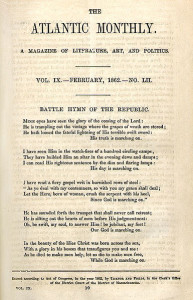

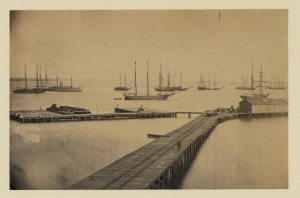
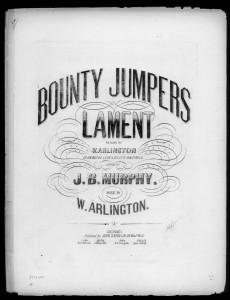
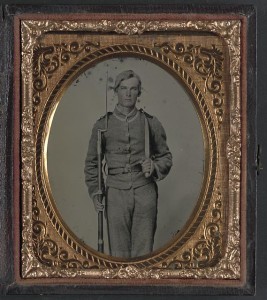
![The ever welcome Sanitary Commission (Hartford, Conn. : The War Photograph & Exhibition Co., No. 21 Linden Place, [between 1861 and 1869]; LOC: LC-DIG-stereo-1s02810)](https://www.bluegrayreview.com/wp-content/uploads/2015/01/1s02810r.jpg)
![The ever welcome Sanitary Commission (Hartford, Conn. : The War Photograph & Exhibition Co., No. 21 Linden Place, [between 1861 and 1869]; LOC: LC-DIG-stereo-1s02810)](https://www.bluegrayreview.com/wp-content/uploads/2015/01/2s02809rx.jpg)
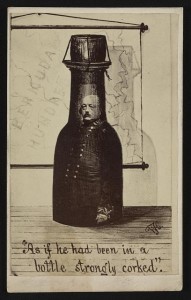
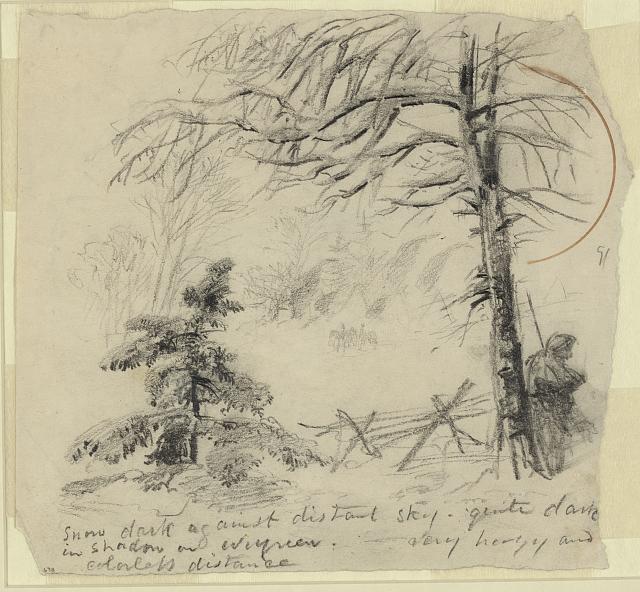
![The March across the Plains in a Snow Storm [Gen. Albert Johnston's march to Camp Scott, Utah Territory -- troops] (Illus. in: Harper's Weekly, v. 2, (1858 April 24), p. 265; LOC: LC-USZ62-438)](https://www.bluegrayreview.com/wp-content/uploads/2015/01/3a04379r.jpg)
